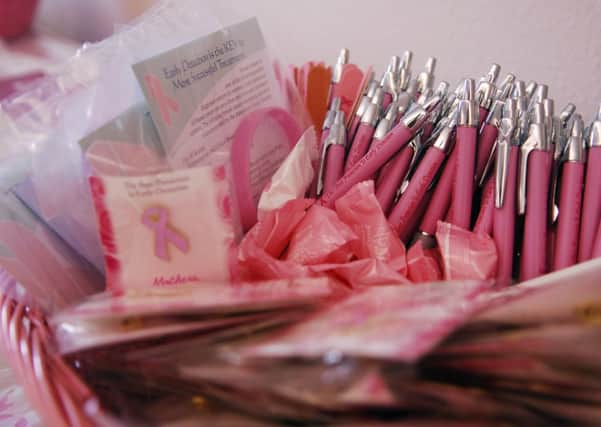Health officials pilloried over breast cancer drug


NHS red tape means that women at high risk of getting the disease cannot access one drug which can prevent more than 50 per cent of cases, two breast cancer charities have said.
The National Institute for Health and Care Excellence (Nice) recommends that women deemed to be at moderate or high risk of breast cancer should be offered chemoprevention drugs tamoxifen and raloxifene.
Advertisement
Hide AdAdvertisement
Hide AdCharity Breast Cancer Campaign said these drugs can reduce their risk of getting the disease by around 35 per cent if taken once a day for five years. But after the guidance was published, new trial data showed that anastrozole, which costs 7p a day per patient, can prevent as many as 53 per cent of cases when taken over the same time-frame.
Professor Tony Howell, director of research at the Genesis breast cancer prevention charity, said that it could take Nice “years” to revisit their guidance and in the meantime women will struggle to access the drug.
Breast Cancer Campaign said that the health system is “not geared” towards introducing old drugs for new purposes.
Baroness Delyth Morgan, chief executive at the charity, said: “The system that we have got is geared up towards the introduction of new drugs and what we’re talking about is re-purposing drugs and there aren’t the same drivers in the system to give this new evidence the push that it needs to get into practice.”
Prof Howell added: “Nice say you can use tamoxifen and raloxifene but they haven’t said anything about anastrozole and you can imagine it will be another 200 years before they do,” he said.
“We’ve got a drug which is really good which we won’t be able to use because they haven’t passed it.
“The next major block is the MHRA (Medicines and Healthcare products Regulatory Agency) who say ‘if you want to change the label, the company who made the drug 30 years ago has got to come back to us with a major application costing them thousands of pounds to get that label changed’. The drug companies aren’t interested in that.”
When asked specifically about anastrozole, which is currently licensed for breast cancer treatment but not prevention, Prof Howell added: “Nice and MHRA are not blocking it, they are just not thinking.
Advertisement
Hide AdAdvertisement
Hide Ad“This is an old drug, it’s there for the treatment of breast cancer and we know from our own trial that it reduces risk by about 50 per cent with not much in the way of side effects.
“With anastrozole, what happens next? You’re not allowed to use it because MHRA won’t pull their finger out and do anything. Nice won’t have another comment about this because they’ve just said something about risk and prevention - they’re not going to do anything more on that for I don’t know, five years? So Nice won’t pass this. MHRA won’t allow us to prescribe it.”
He said the drug was essentially “sitting on the shelf”, adding: “That is a better drug than tamoxifen with a 53 per cent reduction in risk. If you give it to a woman, you know you are reducing her risk by just over half.”
Prof Howell and Breast Cancer Campaign have estimated that if women at moderate or high risk were offered chemoprevention drugs, including anastrozole, up to 3,750 cases could be prevented across the UK each year.
But they said many women are missing out on these drugs because they are unaware of their heightened risk.
Many associated an increased risk with a family history of the disease but are unaware of other risk factors including their age, being overweight or having a late age of first pregnancy, Prof Howell said.
“Not many women over 50 realise they have a high risk but 10 per cent to 15 per cent do,” he said.
He said that so far “not many” women have been given preventative drugs already approved by Nice. “The number is really minuscule. First of all because Nice only produced those guidelines in June last year. There are some women getting these drugs but not very many because there is not a good mechanism (of testing for risk).
Advertisement
Hide AdAdvertisement
Hide Ad“There is this big group of women out there who don’t know they are at increased risk and they have no way of getting these drugs.”
The charity has helped to draft a Private Members Bill, which is being put forward by Conservative MP Jonathan Evans, to try to address the issue where old drugs are being prevented from being licensed for new purposes.
Nice said that it “reviews its guidance at regular intervals to ensure recommendations remain based on the best available evidence. Any new research that is published will be taken into consideration.”
An MHRA spokesman added: “Anastrazole is currently approved and marketed in the UK for use in the treatment of advanced breast cancer in postmenopausal women.
“To approve anastrazole for other health conditions such as chemoprevention in ‘at risk’ women, the MHRA would need to receive a medicines licence application or a licence variation request from the current holder of the medicines licence. The MHRA would then assess its safety, efficacy and quality as part of the normal medicines licensing approval process, including results from clinical trials.
“The fees involved depend on whether this is a variation to an existing licence or an application for a new marketing authorisation. They will also depend on whether the medicine is to be marketed in the UK only or in UK and other European member states.”